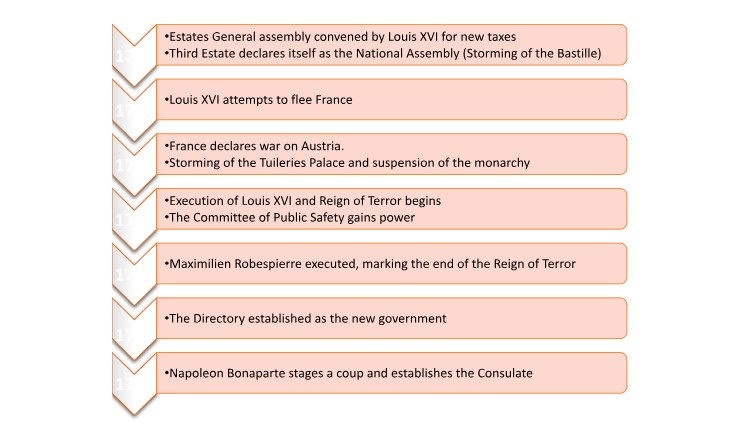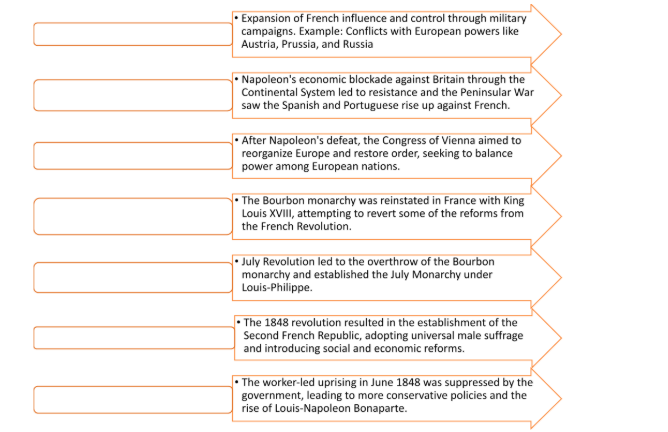FRENCH REVOLUTION
Published on 05 Oct 2025
The French Revolution, occurring from 1789 to 1799, was a transformative event in Europe that championed enlightenment values and democracy, leading to the establishment of a rational and egalitarian society. It sparked widespread social and political unrest, resulting in the overthrow of the monarchy and inspiring the decline of absolute monarchies across Europe.

Important Events that marked the French Revolution
National Assembly (1789-1791):
Estates-General: Convened in 1789 to address financial and political crises.
Tennis Court Oath: Oath taken by the Third Estate to establish a constitutional monarchy.
Storming of the Bastille: Symbolic event representing the rebellion against royal authority.
Declaration of the Rights of Man and the Citizen: Document outlining principles of equality, liberty, and fraternity was adopted.
Legislative Assembly (1791-1792):
Constitution of 1791: Established a limited constitutional monarchy and legislative assembly.
War with Austria and Prussia: Conflict resulting from fears of foreign intervention to restore the monarchy.
Brunswick Manifesto: Threatening declaration by the Prussian army against revolutionaries in Paris.
Overthrow of the Monarchy: The monarchy was abolished, leading to the establishment of the First French Republic.
National Convention (1792-1795):
Execution of Louis XVI: King Louis XVI was found guilty of treason and executed in 1793.
Reign of Terror: This period was marked by political repression, mass executions, and Robespierre's Committee of Public Safety.
Thermidorian Reaction: Overthrow of Robespierre and the Committee, leading to a more moderate phase in the revolution.
Directory (1795-1799):
Establishment of the Directory: A new governing body comprised of five directors.
Financial Instability: Economic challenges, inflation, and corruption weakened the Directory.
Rise of Napoleon Bonaparte: Napoleon seized power in the 1799 coup d'état, marking the end of the Directory and the beginning of the Napoleonic era.
Causes of the French Revolution
Social Causes
Division of society: There existed three classes, wherein the privileges were enjoyed by the upper class only.
Example: 60 per cent of the land was owned by nobles, clergy and other richer members of the third estate.
Tax Exemptions and Feudal Privileges: The first two estates (nobles and clergy) were exempted from paying taxes to the state, unlike the third estate.
Example: The Church extracted its share of taxes called tithes from the peasants.
Moral degeneration: The first two estates neglected their responsibilities, becoming greedy and corrupt courtiers.
Example: The monarch's administration was plagued by corruption and lacked the will to implement necessary reforms.
Rise of the Middle Class: The growing middle class believed in merit-based social positions rather than privileges based on birth
Economic Causes
Financial Crisis: Long years of war and maintaining an extravagant court at Versailles drained France's financial resources.
Example: The cost of wars, such as the Seven Years' War and the American Revolutionary War, put a strain on the economy.
Economic condition: Unemployment and inequality rose significantly, while wages did not keep pace with the price rise. This led to increasing commodity prices and food shortages.
Example: The depression of 1778 and crop failures in 1787 led to a disastrous economic situation.
Aristocratic Resistance: Ministers proposed restructuring the tax system, including taxing the aristocracy, to address the economic crisis.
Example: The aristocracy resisted the proposed tax reforms, leading to an "aristocratic revolt" and highlighting the growing tension between different social classes.
Role of Philosophers
Impact of French Philosophers: Montesquieu, Voltaire, and Rousseau played a significant role in shaping the intellectual climate of the time.
Example: Age of Reason, saw these intellectuals spreading new ideas and philosophies that challenged the existing social and political order.
Philosophical Ideas: Voltaire criticized religion, while Locke rejected the absolute right of monarchs.
Example: Rousseau advocated for the doctrine of popular sovereignty, emphasizing the idea that political power should rest with the people. Montesquieu proposed the separation of powers within the government, dividing it into legislative, executive, and judiciary branches.
Emphasis on Social Reforms: French philosophers stressed the importance of reason over prejudice and irrational beliefs.
Example: They condemned slavery and advocated for its abolition.
Guiding Principles of the Revolution: The ideas put forth by these philosophers, such as liberty, equality, and fraternity, became guiding principles of the French Revolution.
Impact of the French Revolution
Abolition of Nobility and Establishment of Capitalism: The National Assembly's legal abolition of the nobility and their feudal privileges in 1789 led to the establishment of capitalism.
Example: The nobility lost their privileged status and the power dynamics shifted towards a more egalitarian society.
Declaration of the Rights of Man and of the Citizen: This is a significant statement of universal human rights.
Example: This declaration emphasized the fundamental rights and freedoms of individuals, setting a precedent for future declarations of human rights.
Redefinition of Nation and Sovereignty: The revolution gave a new meaning to the term "nation," emphasizing that the nation consists of its people rather than just a territorial entity.
Example: It influenced nationalist movements and the idea of popular sovereignty worldwide.
Advancement of Democracy and Equality: The French Revolution established the first genuinely democratic government, granting voting rights and equality to various social groups such as workers, artisans, and poor peasants.
Example: The Civil Code of 1804 (The Napoleonic Code) did away with all privileges based on birth, established equality before the law and secured the right to property.
Separation of Church and State: The formal separation of church and state in 1794 established the basis for a secular state and diminished the influence of the church in personal lives and governance.
Example: This separation promoted religious freedom and secular governance, influencing the development of modern states.
Abolition of Slavery and Republic in Haiti: France abolished slavery in its colonies, leading to the establishment of a republic in Haiti, the first republic established by black people.
Example: The abolition of slavery and the rise of republicanism in Haiti had a profound impact on the fight against colonialism and the struggle for racial equality.
Reorganization and Modernization efforts: It led to a more efficient administrative system, standardized measurements, and the creation of national schools known as lycées.
Example: In India, Tipu Sultan and Ram Mohan Roy were inspired by this.
Impact on Europe and the World: The French Revolution had a far-reaching impact on politics, society, religion, and ideas.
Example: It inspired liberal movements, calls for democracy, and the end of feudal and traditional practices not only in Europe but also in the New World and colonies around the world.
Role of Women in the French Revolution
Active Participation: Women from the third estate actively participated in the French Revolution.
Example: Women played a significant role in the Women's March on Versailles in 1789, demanding bread and justice.
Formation of Political Clubs and Demands: Women established their own political clubs and newspapers to discuss their interests.
Example: The Society of Revolutionary and Republican Women advocated for political rights for women, including the right to vote and hold office.
Early Reforms for Women: In the early years of the revolution, the government introduced some laws to improve the lives of women.
Example: Compulsory schooling for girls and protection from forced marriages were introduced.
Struggles and Repression: Women's pursuit of equal political rights faced challenges and repression during the revolution.
Example: The Reign of Terror led to the closure of women's clubs and the arrest and execution of prominent women activists.
Continued Movements: Women's movements for voting rights and equality persisted beyond the French Revolution.
Example: The fight for women's suffrage continued globally through the late 19th and early 20th centuries.
The French Revolution was a continuing revolution
The French Revolution unfolded in phases, extending into the 1830s and 1840s. The Revolution of 1830, or the July Revolution, led to the ousting of the Bourbon monarchy, establishing the July Monarchy under Louis-Philippe. The revolutionary spirit persisted into the 1840s, characterized by further social and political movements. In 1848, the Revolution of 1848 erupted, resulting in the abdication of Louis-Philippe and the establishment of the Second French Republic. These phases showcased the enduring desire for political reform, social progress, and the pursuit of democratic governance and rights within France.

Both the revolutions of 1830 and 1848 in France were significant in challenging existing political regimes and advocating for political reform and social change. While the Revolution of 1830 resulted in the establishment of the July Monarchy, the Revolution of 1848 led to the creation of the Second French Republic and the implementation of various reforms before transitioning into a more conservative era.
Causes for the Success of Napoleon
Inherited Revolutionary Forces: Napoleon benefited from the military and political forces of the French Revolution, which he exploited for his own ambitions.
Desire for Stability and Security: France had experienced a decade of revolutionary turmoil, leading to a longing for a stable government that could provide security.
Military Victories and Heroism: Napoleon's military innovations and victories, particularly against the Austrians in Italy, earned him national hero status.
Example: His success in consolidating power and declaring himself Emperor of France in 1804.
Effective Administration and Reforms: Napoleon implemented administrative reforms that consolidated the achievements of the French Revolution and suppressed certain aspects.
Example: Centralizing the tax system, establishing the Bank of France, expanding mandatory education, and introducing the Napoleonic Civil Law Codes.
Suppression of Liberties: Napoleon curtailed civil and political liberties through strict censorship and a police state to protect his power.
Utilization of Nationalism: Napoleon recognized the importance of nationalism in maintaining the loyalty of the French people.
Example: Promoting a sense of national identity and pride through military victories and symbols.
Personal Ambition and Charisma: Napoleon's uncommon personality, soaring ambition, and military genius played a crucial role in his success.
Example: His ability to seize power and establish his rule despite his humble beginnings as an ordinary soldier.
The Fall of Napoleon
Weaknesses of the Napoleonic System:
Dictatorship: The concentration of power in one person, Napoleon, led to weaknesses in governance and decision-making.
Dependence on One Person: The system relied heavily on Napoleon's leadership, making it vulnerable to his personal failures or absence.
Militaristic Nature: The continuous state of war and reliance on military conquests became unsustainable.
Adoption of Tactics by Opponents: As Napoleon's opponents learned and adopted his tactics of warfare, it reduced his strategic advantage.
Spirit of Nationalism:
Spread of Nationalism: Nationalist sentiments grew among the conquered territories, leading to a desire for independence and resentment towards foreign rule.
Hatred for Foreigners: Subject people developed strong animosity towards the French and their rule.
Naval Superiority and Strong Finances of Great Britain:
British Naval Power: The British navy maintained superiority, preventing Napoleon from establishing control over the seas and conducting successful invasions.
Financial Strength: Great Britain's robust finances provided resources for sustained warfare against Napoleon.
Failure of the Continental System:
Continental System: Napoleon's economic blockade aimed at weakening Great Britain by restricting trade with European nations.
Ineffectiveness: The blockade failed to cripple the British economy and instead caused economic hardships for the countries under Napoleon's control.
Peninsular War with Spain and Russian Campaign:
Peninsular War: The conflict in Spain drained French resources and led to guerrilla warfare, sapping their strength.
Russian Campaign: Napoleon's ill-fated invasion of Russia resulted in a disastrous retreat, causing significant military losses and diminishing his reputation.
Comparison of American and French Revolution
The French Revolution was a profound social and political upheaval in France that led to the end of the monarchy, the rise of radical ideologies, and the restructuring of society. It marked a turning point in history, inspiring movements for democracy, liberty, and equality around the world.
Tags:
History & Culture
Keywords:
FRENCH REVOLUTION
Important Events that marked the French Revolution
National Assembly
Tennis Court Oath
Storming of the Bastille
Estates-General
Declaration of the Rights of Man and the Citizen
Constitution of 1791
Brunswick Manifesto
First French Republic
National Convention
Execution of Louis XVI
Reign of Terror
Thermidorian Reaction
Directory
Napoleon Bonaparte
Causes of the French Revolution
estates
noble
clergy
Seven Year war
aristocratic revolt
Montesquieu
Voltaire
Syllabus:
General Studies Paper 1
Topics:
World History
Related Articles